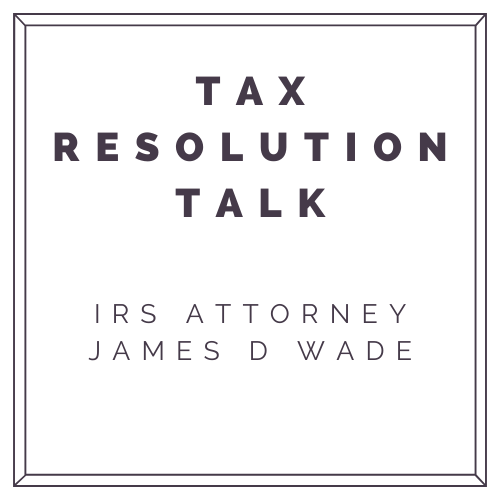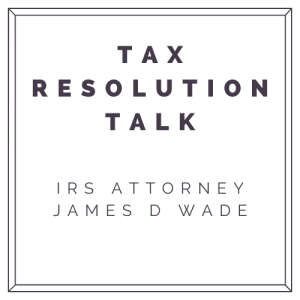
499
Downloads
29
Episodes
Welcome to Tax Resolution Talk. Dealing with the IRS is hard and stressful. Tax attorney James Wade lays out what the IRS can and cannot do to you. If you have unfiled taxes, are being audited or dealing with unpaid taxes then this podcast is for you. Need help now to end your IRS nightmare? Call 207-502-7181 today.
Episodes

Thursday Sep 23, 2021
Episode 30: What to Know About IRS‘ Private Collection Agencies
Thursday Sep 23, 2021
Thursday Sep 23, 2021
In this episode, I discuss the IRS' use of private collection agencies or PCAs. With the widespread use of phone calls and emails from scam artists pretending to be the IRS you are right to be skeptical. However, the IRS has indeed farmed out collections of certain tax debts to private companies. Do you know how to identify fact from fraud?
I will go over the IRS' process of assigning a case to a PCA and what information to look for to verify that a collection call is related to a real IRS private collection agency and not a scam artist.
Listed below is a link to IRS resources you can use to get more detail on the IRS' use of PCAs.
Read the rest of this entry »
Thursday Jul 01, 2021
Episode 29: The IRS is Back in Business - Beware of Levy Notices
Thursday Jul 01, 2021
Thursday Jul 01, 2021
In this episode, I discuss what you should do if you receive a notice of intent to levy. Mid-June the IRS issued a slew of notices to delinquent taxpayers after pausing collections for COVID. I explain what you need to know about these notices to avoid your wages being garnished or your bank funds seized.
Like a rattlesnake, a levy notice is a warning. Fail to act and the IRS will strike. You face wage garnishment or a bank levy, meaning you may no longer have access to funds needed for life's necessities like food, gas or rent. Act now to avoid the danger and protect your assets.
Read the rest of this entry »
Tuesday Jun 29, 2021
Episode 28: My Ex Spouse Claimed My Child, Now What?!
Tuesday Jun 29, 2021
Tuesday Jun 29, 2021
In this episode, I discuss what to do if your ex-spouse or ex-partner claims your child when he or she should not have.
I get this question all the time and it is so painful to the people affected. Often the person who is supposed to claim the child is denied important deductions and credits, which increases their taxes and reduces potential refunds. Refunds which are often used for necessary expenses to care for the child, such as food, clothing and shelter.
Here are the steps you need to take:
1. file a paper tax return
2. gather all documentation you have and put it together in a nice package to provide to the IRS (I suggest doing that as soon as you can as it may be too late to get vital documents later when the IRS does contact you).
3. provide the IRS the requested documents and await the results (make sure to file everything in advance of any deadlines).
4. if the IRS disagrees with you, you will get the right to file an appeal
Read the rest of this entry »
Monday May 17, 2021
Episode 27: Don't Lose Your Golden Ticket to US Tax Court
Monday May 17, 2021
Monday May 17, 2021
In this episode, I discuss why you don't want to lose your "golden ticket" to U.S. Tax Court.
The IRS sends out a notice to taxpayers when it proposes an additional assessment. This notice is called a statutory notice of deficiency or SNOD. Along with this notice, you receive your right to challenge the IRS assessment in U.S. Tax Court. The catch is that you must file your challenge (called a petition) within 90 days of the date on the notice. Fail to do so results in a great many problems.
In this episode, I explain what the golden ticket is and why you should take great pains to not lose your right to petition the U.S. Tax Court.
Read the rest of this entry »
Wednesday May 05, 2021
Episode 26: Haven't Filed Your Taxes? Beware. The IRS Can File One For You.
Wednesday May 05, 2021
Wednesday May 05, 2021
In this episode, I discuss what the IRS can do if you fail to file your tax return. Believe it or not, the IRS can "file" a return on your behalf and pursue collection of any taxes assessed.
Here's what happens. The IRS receives a great deal of information from third-parties, such as your employer (Form w-2) or from your investment company (Form 1099-DIV or 1099-B). Every year, the IRS will compare the information on file from these third-parties to any filed returns (or lack thereof). If the IRS detects that a return has not been filed and it appears from its information that a return should have been filed then it will contact the taxpayer to secure a return.
If the taxpayer fails to file a return after demand then the IRS may prepare one based on the income information it has on hand. Don't expect the IRS to be looking out for your best interest. Instead, you will be treated as filing single or married filing separate (depending on your marital status). You will get only the standard deduction and that's it. As you can imagine, this results in a much larger balance due than if you filed a return. So what can you do?
Listen to find out.
Read the rest of this entry »
Tuesday Mar 16, 2021
Episode 25 - Some Dirty Secrets About Filing a Joint Tax Return
Tuesday Mar 16, 2021
Tuesday Mar 16, 2021
In this episode, I discuss some of the dirty secrets around filing a joint return. I will be answering such questions as:
- Am I required to file a joint return?
- Can't I just get a divorce to split our joint tax debt?
- I didn't sign the return, so I can't be held liable can I?
- I can just file a joint return now and if things don't go right, we can just file amended returns to file separately.
My goal is to help taxpayers understand that filing a joint tax return has its advantages. You just need to know that your choice should not be a blind default but a thoughtful choice. I hope I hit the mark.
Read the rest of this entry »
Wednesday Mar 10, 2021
Episode 24 Home is Where the Heart is and Maybe Even Some Taxes
Wednesday Mar 10, 2021
Wednesday Mar 10, 2021
You know the old saying that home is where the heart is. The idea is that home is where your social life is centered around, often where your family resides. It is also the place that fixes your location for state income tax purposes. In this episode, I discuss the concept of domicile and how it impacts your overall tax bill. I will also talk about statutory residency, where you could be taxed as a resident even if you consider somewhere else home.
If you are interested, you can follow this link to read Maine's guide on state residency for tax purposes. Each state is different but I find Maine to follow the general trend in this area of tax law. https://www.maine.gov/revenue/sites/maine.gov.revenue/files/inline-files/residency_guidance_2019.pdf
Read the rest of this entry »
Thursday Jan 14, 2021
Episode 23: IRA Tax Traps
Thursday Jan 14, 2021
Thursday Jan 14, 2021
I have discussed income tax problems and payroll tax problems but in this episode I will be discussing potential tax time bombs hidden in your retirement plan. In this episode, we will discuss Individual Retirement Accounts or IRAs.
IRAs are easy to set up, easy to manage and unfortunately easy to get in trouble with Uncle Sam if you do the wrong thing. Learn the big no-no's of handling an IRA:
- Learn the prohibited investments that can cause an early taxable distribution;
- Discover which transactions can cause your IRA to be terminated, leaving you with a potentially huge tax debt; and
- Watch out for excess contributions that can result in large penalties that will eat up any potential income earned.
I hope you enjoyed this episode and in the next episode I will be discussing employer sponsored plans such as 401ks and 403bs.
Read the rest of this entry »
Sunday Dec 13, 2020
Episode 22: Payroll Tax Problems
Sunday Dec 13, 2020
Sunday Dec 13, 2020
Payroll taxes are the worst kind of tax problems to have with the IRS. Most business debts end with the failure of a business but trust fund taxes (the employees' payroll tax withholdings for income taxes, FICA and medicare taxes) can haunt a business owner long after the business is gone.
In this episode, I discuss the perils of not properly handling payroll taxes in your business. Employees' tax withholdings are called trust fund taxes because the funds are held "in trust" by the employer to pay to the IRS (or state for that matter) when due. When you pay your employees but no the IRS you are essentially "stealing" the employees' money that should be properly paid over to the IRS.
Learn the basics of your personal liability for unpaid payroll taxes. What are the things the IRS looks at when determining who is responsible personally for those unpaid trust fund taxes. Learn what things you should consider if you are thinking of starting your own business and will have employees.
Read the rest of this entry »
Tuesday Nov 17, 2020
Episode 21: IRS Announces New Taxpayer Friendly Initiatives
Tuesday Nov 17, 2020
Tuesday Nov 17, 2020
The IRS has rolled out some new initiatives to help taxpayers in trouble. Details are forthcoming but here is what we know right now.
The IRS is offering the following options, in addition to the regular tools, to provide relief during the pandemic:
- Short-term extensions of time to pay the tax balance in full have been extended to 180 days (six months). Prior to this change, taxpayers had only 120 days on a short-term extension.
- To avoid taxpayer default on existing installment agreement, the IRS will automatically add certain new tax balances to the agreement.
- Individuals who owe less than $250,000 can set up an installment agreement without having to provide financial statements and substantiation of expenses. For this to apply, the liability must be paid in full within the statute of limitations on collection.
- Individual taxpayers who owe only for 2019 and who owe less than $250,000 may qualify for an installment agreement without the IRS filing a notice of federal tax lien.
- Taxpayers with existing direct debit installment agreements who owe less than $50,000 can propose a lower monthly amount and change their payment due date online.
- If the IRS has identified your return for an audit or examination
- If the IRS intends to take collection action against you, such as by filing a lien or levy
- How the IRS applied any tax payments to your account
Talk with a tax professional if you or someone you know has a tax problem. One of these initiatives or one of the IRS regular resolution options can help you permanently resolve your IRS problems. Act now to get help. Doing nothing only makes the problem worse.
Read the rest of this entry »